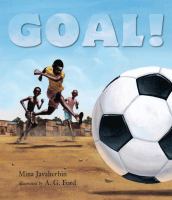
Arriving in time for the 2010 World Cup, this heart-tugging picture book from a debut author tells a lyrical soccer story in the voice of a young boy in a South African shantytown. After winning a federation-size football at school, the narrator and his friends enjoy a game, but bullies interrupt them. With some deft foot maneuvers, though, the young players deter the aggressors and resume their game, this time with a wary lookout: The streets are not always safe. The poetic text's rhythmic repetition emphasizes the boys' joyful empowerment: When we play, / we forget to worry. / When we run, / we are not afraid. In full-page oil paintings, Ford uses unusual angles to intensify the sense of the scuffling, exciting action; the tense confrontation; and the reality of shantytown life. An afterword includes fascinating historical notes and reinforces the narrator's moving message about soccer's power to inspire and connect fans and players around the world: I follow the ball to the end of the alley; / I follow the ball to the end of the world. --Engberg, Gillian Copyright 2010 Booklist
Gr 2-4-Six boys in a small South African town thwart a group of bullies who threaten to stop their soccer game by stealing their prize possession, a federation-size ball. The camaraderie of these youngsters is evident as they play soccer after chores and homework are done in order to find some relief from daily hardships. The bullies arrive suddenly on bikes, even though the boys had planned ahead and posted a lookout atop a nearby building. The author uses repetitive phrasing, "Left is clear. Right is clear," to indicate that the youth are always aware that the streets are not safe. Illustrations rendered in oil are impressive. Large and colorful action shots, many full spread, keep the story moving at a quick pace. Expressive facial features emphasize the tension felt when the hoodlums interrupt the soccer fun. Choose this book with an international bent to supplement other books on bullying, because it will open up another opportunity for conversation and discussion.-Blair Christolon, Prince William Public Library System, Manassas, VA (c) Copyright 2010. Library Journals LLC, a wholly owned subsidiary of Media Source, Inc. No redistribution permitted.
In her debut picture book, Javaherbin crisply relays a simple story that should strike a chord with a wide range of readers. In a barren South African village, Ajani calls for his friends to come out to play soccer. The boy carries the pristine federation-size ball (which he won for being the best reader in class) in a dented pail he'll later use to fetch water. Ford's (Barack) dramatically lit oil paintings convey Ajani's excitement and pride about his new acquisition ("We are real champions, playing with a real ball"). He and his friends are also wary of bullies who roam the streets, and one boy stands guard on a rooftop. When the mean boys arrive, Ajani surreptitiously kicks the soccer ball into the overturned bucket and the oblivious bullies instead steal an old plastic ball nearby, barking, "No playing soccer here or you'll be sorry." While the level of danger-and deprivation-these boys face may be unfamiliar to many American readers, the quick-moving soccer action, tension, and triumph over the common threat of bullies have near-universal appeal. Ages 6-10. (Apr.) (c) Copyright PWxyz, LLC. All rights reserved


